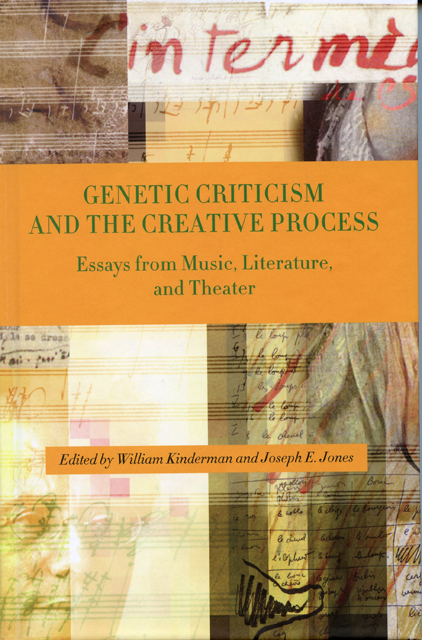Book contents
- Frontmatter
- Contents
- Acknowledgments
- Genetic Criticism and the Creative Process
- 1 Texts, Variants, and Variations: Evolving Contexts in Literature and Theater
- 2 Genetic Processes in Music: From Beethoven to Leroux
- 1 From Varieties of Genetic Experience to Radical Philology
- 2 Variant and Variation: Toward a Freudo-bathmologico-Bakhtino-Goodmanian Genetic Model?
- 3 The Genetic Record of a Voice: Variants in Barthes's Le Plaisir du texte
- 4 Can Genetic Criticism Be Applied to the Performing Arts?
- 5 “The hardy Laurel”: Beckett and Early Film Comedy
- 6 From Melodic Patterns to Themes: The Sketches for the Original Version of Beethoven's “Waldstein” Sonata, Op. 53
- 7 From Conceptual Image to Realization: Some Thoughts on Beethoven's Sketches
- 8 The Process within the Product: Exploratory Transitional Passages in Beethoven's Late Quartet Sketches
- 9 “They Only Give Rise to Misunderstandings”: Mahler's Sketches in Context
- 10 A Study of Richard Strauss's Creative Process: Der Rosenkavalier's “Presentation Scene” and “Schlußduett”
- 11 Genetic Criticism and Cognitive Anthropology: A Reconstruction of Philippe Leroux's Compositional Process for Voi(rex)
- Afterword
- Contributors
- Index
Genetic Criticism and the Creative Process
Published online by Cambridge University Press: 02 March 2023
- Frontmatter
- Contents
- Acknowledgments
- Genetic Criticism and the Creative Process
- 1 Texts, Variants, and Variations: Evolving Contexts in Literature and Theater
- 2 Genetic Processes in Music: From Beethoven to Leroux
- 1 From Varieties of Genetic Experience to Radical Philology
- 2 Variant and Variation: Toward a Freudo-bathmologico-Bakhtino-Goodmanian Genetic Model?
- 3 The Genetic Record of a Voice: Variants in Barthes's Le Plaisir du texte
- 4 Can Genetic Criticism Be Applied to the Performing Arts?
- 5 “The hardy Laurel”: Beckett and Early Film Comedy
- 6 From Melodic Patterns to Themes: The Sketches for the Original Version of Beethoven's “Waldstein” Sonata, Op. 53
- 7 From Conceptual Image to Realization: Some Thoughts on Beethoven's Sketches
- 8 The Process within the Product: Exploratory Transitional Passages in Beethoven's Late Quartet Sketches
- 9 “They Only Give Rise to Misunderstandings”: Mahler's Sketches in Context
- 10 A Study of Richard Strauss's Creative Process: Der Rosenkavalier's “Presentation Scene” and “Schlußduett”
- 11 Genetic Criticism and Cognitive Anthropology: A Reconstruction of Philippe Leroux's Compositional Process for Voi(rex)
- Afterword
- Contributors
- Index
Summary
Not only the final outcome but also the process of creative endeavor has long attracted attention in various artistic disciplines, but only recently has the potential of such research been seriously explored. The most rigorous basis for the study of artistic creativity comes not from anecdotal or autobiographical reports, but from original handwritten sketches and drafts and preliminary studies, as well as from revised manuscripts and typescripts, corrected proof sheets, and similar primary sources. Especially since the eighteenth century, writers, composers, and painters have been much concerned with originality of style, which has encouraged intense preliminary efforts preceding and leading toward the production of finished artistic works.
The term “genetic criticism” or “critique génétique” relates not to the field of genetics, but to the genesis of works of art, as studied in a broad and inclusive context. This approach stands in contrast to the so-called “new criticism” of the mid-twentieth century, with its formalist focus on the text itself and disinclination to probe issues of creative process, lest these involve entanglement with the so-called intentional fallacy. More recently, growing recognition of the value of contextual studies and of the problematic nature of the notion of a single definitive text have exerted a welcome infl uence. Especially promising are approaches that integrate source studies with interpretative analysis, probing the aesthetic meaning of artworks in a rich contextual field.
The chapters in this volume explore aspects of genetic criticism in an interdisciplinary context. A common through-line of many of these chapters pertains to the essential continuity between a work and its genesis. Genetic criticism might appear to destabilize the final text, undermining the work-concept by privileging genesis over structure. However, such an approach often opens perspectives that serve as a promising platform for critical interpretation, and analysis remains vitally important to the evaluation of sketches and drafts, whose content is often elusive and enigmatic. In practice, the insights offered by genetic criticism can sometimes enrich our experience and appreciation of a composition more than studies that are confined to the finished work of art.
Such an approach departs from the idea of a singular, isolated, unassailable text, lifted out of history. Appropriately, then, this collection begins with a study that addresses the connections between genetic criticism, textural studies, and edition theory.
- Type
- Chapter
- Information
- Genetic Criticism and the Creative ProcessEssays from Music, Literature, and Theater, pp. 1 - 16Publisher: Boydell & BrewerPrint publication year: 2009
- 1
- Cited by



